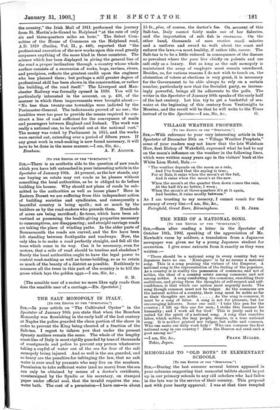THE SALT MONOPOLY IN ITALY.
ero THE EDITOR OP THE "spscremoa."1 Si,—In your article on "The Cultivated Oyster" in the Spectator of January 10th you state that when the Bourbon Monarchy was flourishing in the early half of the last century at Naples the police guarded the clean portion of the shore in order to prevent the King being cheated of a fraction of the Salt-tax. I regret to inform you that under the present dynasty matters remain the same. The whole of the lengthy coast-line of Italy is most rigidly guarded by tens of thousands of coastguards and police to prevent any person whatsoever taking a cupful of water out of the sea for fear of the salt monopoly being injured. And so well is the sea guarded, and so heavy are the penalties for infringing the law, that no salt- water is ever used by peasants who may live on the seashore. Permission to take sufficient water (and no more) from the sea can only be obtained by means of a doctor's certificate, countersigned by the Syndic or his secretary, on stamped paper under official seal, that the invalid requires the sea- water bath. The cost of a permission—I have one—is about 15 fr., plus, of course, the doctor's fee. On. account of this Salt-tax, Italy cannot fairly make use of. her fisheries, and the importation of salt fish is enormous. On the• other hand, thousands of men receive small. salaries and a uniform and sword to walk about the, coast and enforce the laws,—a most.healthy, if rather idle, career. ; The Salt-tax is to be a little reduced in consequence of the disease so prevalent where the poor live chiefly on polenta and use !an only as a luxury. But as long as the salt monopoly is maintained the army of employes must remain unreduced. Besides, as, for various reasons I do not wish to touch on, the abstention of voters at elections is very great, it is necessary for the Government to be able always to rely on a certain number, particularly now that the Socialist party, so increas- ingly powerful, brings all. its adherents to the polls. The writer in the Spectator of January 10th speaks of the early half of the last century. Let him try to get a bucketful of; sea- water at the beginning of this century from Ventimiglia to Messina, and the result will be that he will write to the Times instead of to the Spectator.—I am, Sir, &c., G.






















































 Previous page
Previous page